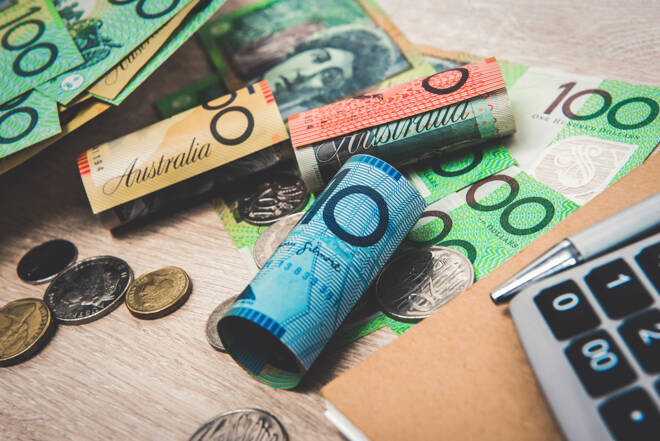Advertisement
Advertisement
AUD to USD Forecast: How Australian Dollar Reacts to Business Confidence Shifts
By:
Business and consumer confidence take center stage, reflecting the Australian Dollar's fluctuating journey
Highlights
- AUD/USD witnessed a 0.85% surge on Monday, rallying from Friday’s slight dip.
- RBA rate hikes impact business and consumer sentiment; China’s economy plays a role.
- Forecasts show the US CPI Report may present a rising annual inflation rate of 3.6%.
Monday Overview
The AUD/USD rallied 0.85% on Monday. Reversing a 0.02% loss from Friday, the Aussie Dollar ended the day at $0.64287. The Australian Dollar fell to a low of $0.63762 before rising to a high of $0.64494.
Business and Consumer Confidence in the Spotlight
Investor interest will focus on business and consumer confidence figures today. These surveys will show the impact of RBA rate hikes and anticipated cycle end on both groups. China’s economic challenges are also expected to influence business sentiment.
Economists forecast the Westpac Consumer Confidence Index to rise by 0.6% to 81.5 in September. However, economists expect the NAB Business Confidence Index to decline from +2 to +1 in August.
Declining business sentiment can reduce hiring, which in turn can lower consumer confidence and spending. While this decrease in consumption can curb demand-driven inflation, eliminating the need for anti-inflationary policies, it can also negatively impact the economy.
Australian private consumption contributes about 50% to the economy.
The Calm Before the Storm as the US CPI Report Looms
Investors await the Fed’s potential end to policy tightening. Economists expect Wednesday’s US CPI Report to show a rise in the annual inflation rate from 3.2% to 3.6%, while core inflation may drop from 4.7% to 4.3% in August.
Forecasts aligned with these numbers could reduce predictions of post-September rate hikes. Though sentiment shifts in Fed policy may hurt the dollar, economic divergence supports it. Once the Fed and RBA end their rate hike cycles, attention will shift to the first to cut rates.
Economic uncertainty in China and weaker economic indicators from Australia suggest the RBA would be the first to move.
This afternoon, the Redbook and WADE Report are unlikely to influence investor sentiment toward Fed policy goals and the AUD/USD pair.
Short-Term Forecast
Easing bets on further Fed rate hikes should deliver AUD/USD support. However, economic uncertainty in China and a stronger macroeconomic environment in the US suggest an RBA rate cut ahead of the Fed, leaving the US dollar in a stronger position over the medium term.
AUD/USD Price Action
Daily Chart
The AUD/USD held above the trend line and the $0.63854 support level. Nonetheless, the Aussie dollar continued to hover below the 200-day and 50-day EMAs, sending bearish price signals.
Better-than-expected business and consumer confidence numbers would support another breakout session. A move through $0.6450 would bring the $0.64900 resistance level into play.
However, a slide in business confidence would likely see the AUD/USD target the $0.63854 support level. A pullback to sub-$0.64 would bring the trend line into view.
The RSI reading of 44.92 shows room for a fall to sub-$0.64 before the AUD/USD enters oversold territory.
4-Hourly Chart
The AUD/USD is above the 50-day EMA, indicating short-term bullishness, but below the 200-day EMA, suggesting long-term bearishness in line with our view on central bank rate cuts.
A hold above the 50-day EMA would bring the $0.64900 resistance level and 200-day EMA into play. We expect selling pressure at $0.64900, with the 200-day EMA confluent with the $0.64900 resistance level.
Weaker-than-expected business and consumer sentiment figures could send the AUD/USD to test the 50-day EMA. A break below the 50-day EMA would bring the $0.63854 support level into play.
Considering the RSI at 59.03, the Aussie dollar has room to run before entering overbought territory.
About the Author
Bob Masonauthor
With over 28 years of experience in the financial industry, Bob has worked with various global rating agencies and multinational banks. Currently he is covering currencies, commodities, alternative asset classes and global equities, focusing mostly on European and Asian markets.
Advertisement
